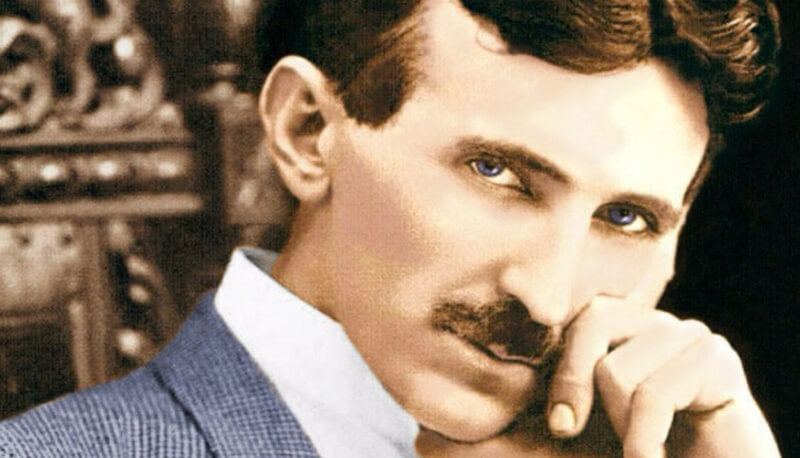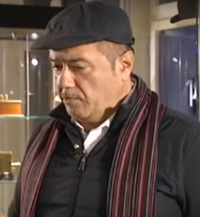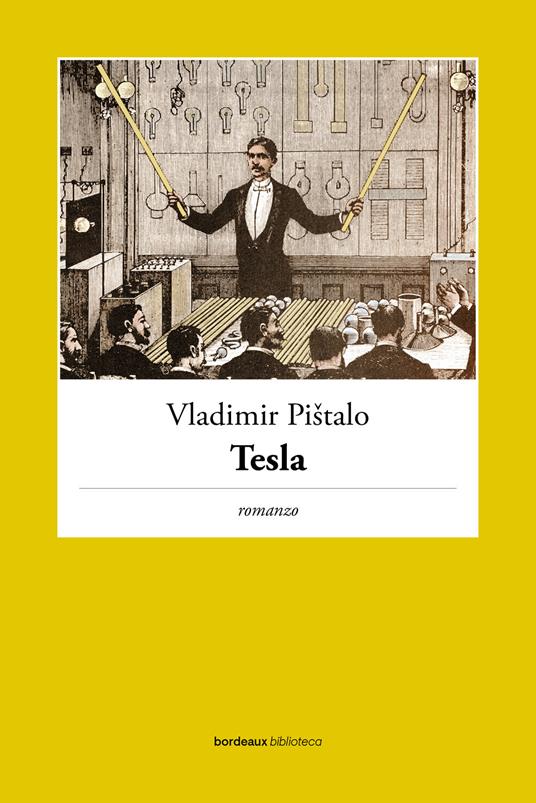The novel was recently released by the types of the Bordeaux publishing house in Rome Tesla by the Serbian writer Vladimir Pištalo. Review
After being translated into about twenty languages, the novel Tesla, portret među maskama [Tesla, ritratto tra le maschere] by the Serbian writer Vladimir Pištalo, for some months it has also been available in an Italian edition, in the translation by Manuela Orazi.
Forgive me if at the beginning of this article I express a judgment: only an author who lived with his own sensitivity the inventions and dreams of Nikola Tesla could transform the life of the great visionary into a novel, thus enriching the long list of biographical books, dramaturgical texts, scientific studies and documentary films dedicated to what is undoubtedly the greatest inventor of the modern era. It had been a long time – more precisely since I had read the splendid biographical novels written by the Sarajevese director and theatrologist Josip Lešić (1929-1993) dedicated to the poets Sibe Miličić and Aleksa Šantić, as well as to the English philanthropist Miss Adeline Irby and her contribution to women’s emancipation in Bosnia during the Austro-Hungarian occupation – that I didn’t happen to come across such intense biographical prose.
Reading this novel (based on the biographical material, but also on the “cracks” in the biography of the Serbian-American scientist, cracks on which Pištalo’s intuition hovered), an anecdote from the life of Thomas Mann came to mind several times. It is said that the writer’s secretary once finished the transcription of the final version of the tetralogy Joseph and his brothers, claimed to have understood only then what that biblical account actually was about. I believe that many readers who are familiar with Thomas Mann’s aforementioned work are aware that a writer is first and foremost a child of his time. Even when he plunges into the past, trying to raise universal questions by resorting to the past perfect, the writer, instead of embodying the biblical age, is always searching – at the same time aware and unaware – of the keys of his time.
The novel Tesla it is a dynamic, three-dimensional fresco of the ideas of the great inventor and his time. The book traces the most important moments in the life and career of the brilliant scientist – who seems to arouse increasing interest internationally (especially in the United States) – by recounting a series of facts that really happened during Tesla’s long life, from birth. (in 1856) in the village of Smiljan, near Gospić, until his death in 1943 in New York, where the scientist died in poverty, almost forgotten by his contemporaries.
Pištalo’s novel invites us to follow in Tesla’s footsteps, from Gospić and Karlovac to Paris, passing through Graz and Prague, and then to accompany him to America (where he moved in 1884) and his rare returns to the Old Continent and his homeland. All the other biographical events of Tesla, including his meeting and collaboration with Thomas Edison, but also with George Westinghouse and other tycoons of the time, you can discover them for yourself. I don’t think I need to remind you of Tesla’s major inventions (you will surely remember at least one by flipping an AC switch. The actual number of Tesla inventions is supposed to be higher than official estimates, which are about seven hundred inventions).
What, however, interested the author of the novel most Tesla – a story, in my opinion, really well told – was to unravel the biographical events of Tesla, observing them both from below and from above, in order to be able to create the portrait not only of a scientist towards whom the world has an enormous debt of gratitude, but also of a man struggling with his most intimate dramas: Tesla son and brother, a man fond of his most sincere friends and tied to his cultural roots, but also pursued, until the last moment of his life , from the ghost of his brother Dane (who died at just fifteen). The fictional transposition of the most intimate feelings of the great scientist is undoubtedly the most salient feature of the novel. Tesla.
I appreciate writers who don’t hesitate to talk about their works (Gombrowicz and Kiš exemplify this trend very well.) In an interview, speaking of Tesla, Vladimir Pištalo stated: “People, in a sense, were not ready to immerse themselves in Tesla’s inner world. It is easy to tell the data, but to penetrate Tesla’s soul and try to understand his psychological world … Tesla believed that electricity represented the pure essence of an impure world (both in a moral and energetic sense). He felt the need for purity and spirituality, he had the feeling that energies permeated matter and that this dynamic was more important than what was measurable, that is, that it was the essence of reality. He said that what matters is that living substance that permeates the world – he spoke of two forces: magnetism and electricity – it is in it that the future and all potentialities reside. (His father, who was a priest, would define that substance with the term ‘spirit’.) The fact that such an internationally influential broadcaster has dedicated a program to Tesla [il riferimento è ad un docu-film targato Discovery che indaga su aspetti meno noti della vita e delle invenzioni di Tesla, ndt.] contributes to the promotion of Tesla’s works. I have the impression that the interest in Tesla’s works is far from waning, indeed it seems to me that it is growing, and this film is the sign of the growing interest, worldwide, in the figure of Tesla ” .
When asked what he thought of some not very credible theories regarding the figure of Tesla, Vladimir Pištalo replied: “There are many erroneous beliefs. In the United States, I have read many books on Tesla that I have found very bad. He was a very unusual man. He knew whole books by heart, he only needed two hours of sleep a night and he could go on like this for years, he believed he could choose when to die and said he would live 156 years, which is why people still marvel today. that Tesla had died at the age of 87. Some even claim that Tesla was killed, as if his statements were enough to corroborate that hypothesis. We are talking about a man who for decades had lived in a state of constant intoxication of discovery. Perhaps he was not a happy man in the conventional sense of the term, as a man who has a family is happy for example, but for Tesla the greatest happiness consisted in experiencing what no one had ever experienced before, in putting himself at the service of humanity, in realizing his role as a bulwark of humanity, one who senses certain phenomena before the rest of the world. Here, for Tesla this was happiness, the full personal fulfillment that he did not tend to equate with the possession of money, much less with family happiness. It was he who chose his own path. Those who consider Tesla an unhappy man, wondering how the great scientist could live without love, use a different yardstick than his own. Yet it was precisely his dedication to science and his role as an outpost of humanity that allowed Tesla to experience a more solemn form of love. Those who do not understand this, I believe, cannot fully understand even the figure of Tesla. You cannot use criteria based on material values to judge the life of a person who did not perceive his own existence in the light of these criteria “.
Pištalo – as he himself stated – has “walked” together with Tesla for about six years (between 2000 and 2008). But I don’t believe him, and I say it without any negative connotations. I think that that journey began much earlier and that during the journey undertaken by Pištalo to discover the time of Tesla, with the intention of knowing every piece of his life and his work, the writer and the scientist found themselves engaged in a constant dialogue between them, but also with that part of humanity that continues to ask itself questions both on progress with a human face and on that with an inhuman face.
A final, very positive note on the writer who until now was known to Italian readers only for the novel Milenijum u Beogradu [Millennio a Belgrado]: in addition to having won the NIN award for best novel written in the Serbian language in 2008 (so when that award still had some meaning), Tesla it is one of the most widely read books in Serbia (it has also attracted positive reactions in other countries of the region) and has been included in the school reading list.
Vladimir Pištalo
Vladimir Pištalo (Sarajevo, 1960) graduated from the Faculty of Law in Belgrade, later pursuing a PhD from the University of New Hampshire in the United States. He taught International History and American History at Becker College in Worcester (Massachusetts). He is currently director of the Serbian National Library in Belgrade. He is the author of numerous works among which the novels stand out Milenijum u Beogradu [Millennio a Belgrado, 2000], Tesla, mladost [Tesla, gli anni giovanili, 2006], Venecija (2011), Sunce ovog dana: Andriću pismo [Il sole di oggi: una lettera per Andrić, 2017] and a collection of essays entitled Značenje džokera [Il significato del jolly, 2019].
Have you thought about a subscription to OBC Transeuropa? You will support our work and receive preview articles and more content. Subscribe to OBCT!
Nikola Tesla, the life of the great visionary between inventions and dreams




